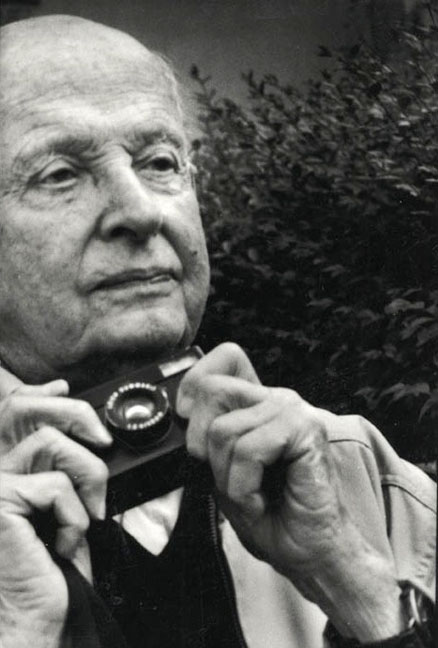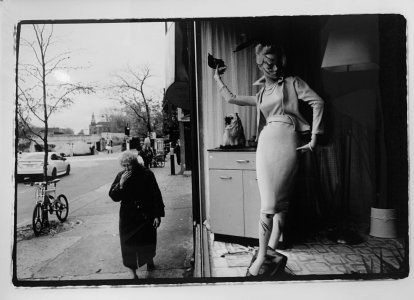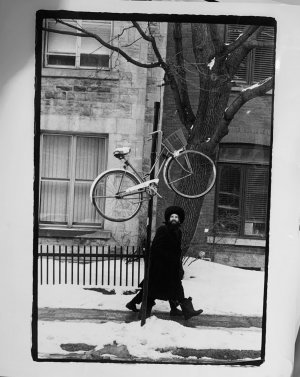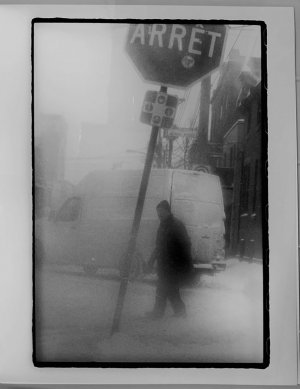You are using an out of date browser. It may not display this or other websites correctly.
You should upgrade or use an alternative browser.
You should upgrade or use an alternative browser.
Why HCB uses a 50mm lens
- Thread starter kshapero
- Start date
- Latest activity Latest activity:
- Replies 327
- Views 42K
pixie79
Established
It changed in Japan! Ernst Haas wrote because of confined smaller areas and crowds,HCB started to use 35mm way more!Henri Cartier-Bresson on the 50mm: “It corresponds to a certain vision and at the same time has enough depth of focus, a thing you don’t have in longer lenses. I worked with a 90. It cuts much of the foreground if you take a landscape, but if people are running at you, there is no depth of focus. The 35 is splendid when needed, but extremely difficult to use if you want precision in composition. There are too many elements, and something is always in the wrong place. It is a beautiful lens at times when needed by what you see. But very often it is used by people who want to shout. Because you have a distortion, you have somebody in the foreground and it gives an effect. But I don’t like effects. There is something aggressive, and I don’t like that. Because when you shout, it is usually because you are short of arguments.”
Erik van Straten
Veteran
Majki
Well-known
Love it
Bill Clark
Veteran
It’s a good all-a-rounder.
I believe he paid more attention to what’s going on in front of the lens.
I believe he paid more attention to what’s going on in front of the lens.
ktmrider
Well-known
As a working newspaper photographer back in the mid 1970’s, we valued fast lenses. I still have a couple f1.2 lenses but so big and so heavy. In digital I have learned to use f4 zooms although with all the electronics built into the lenses, they are even bigger and heavier (thinking Nikon S line for Z cameras).
I no longer shoot in available darkness as we used to say and I love the size of manual Leica lenses so am happy with f2.8. My current trio is the 35f2.8 C Biogon, 50f2.8 Collapsable Elmar II, and 90f2.8 Elmar M. I should sell everything else but then I would just feel another GAS attack.
Erik, beautiful print. One disadvantage of being homeless is the lack of a darkroom. And I hate sitting at a computer using Lightroom.
I no longer shoot in available darkness as we used to say and I love the size of manual Leica lenses so am happy with f2.8. My current trio is the 35f2.8 C Biogon, 50f2.8 Collapsable Elmar II, and 90f2.8 Elmar M. I should sell everything else but then I would just feel another GAS attack.
Erik, beautiful print. One disadvantage of being homeless is the lack of a darkroom. And I hate sitting at a computer using Lightroom.
Erik van Straten
Veteran
Ororaro
Well-known
Dogman
Veteran
In digital I have learned to use f4 zooms although with all the electronics built into the lenses, they are even bigger and heavier (thinking Nikon S line for Z cameras).
I also place value on smaller, slower lenses. I don't need speedy optics when cameras today can produce great results at lofty ISOs. Lenses have gotten so good and sensors can resolve so well, cropping is no longer a great loss in quality. Unfortunately lens makers try to make perfect optics without constraints on size, making excellent but unwieldy lenses. For my new Nikon Z body, I avoided the "S" line and just bought the cheap plastic but optically very good 40/2 and 28/2.8 lenses. I'll mainly use the camera with small adapted MF lenses anyway.
Lenses can sometimes be like shoes. Those beautiful hand tooled designer leather shoes might be nicer looking and better quality but your old canvas sneakers can get you to your destination more comfortably.
......................
Erik van Straten
Veteran
Erik van Straten
Veteran
boojum
Ignoble Miscreant
Thank you, kmtrider, I hope you will have a darkroom soon!
gelatin silver print (cooke amotal 50mm f2) leica m2
Amsterdam 2022
View attachment 4848152
That's a keeper, for sure. And you know I love what the Amotal does with light. You shoot tons of mono and for me when you shoot it through the Amotal that mono has some special magic. As a matter of fact, you are a part of the reason I bought one. They are wonderful lenses. Thanks for this post. ;o)
Erik van Straten
Veteran
boojum
Ignoble Miscreant
Thank you, boojum! This one is for you.
gelatin silver print (cooke amotal 50mm f2) leica m2
Amsterdam, 2022
View attachment 4848257
The Amotal has its failings, it is not a perfect lens. But how it handles light and color, mono or full spectrum, is really unique. I am biased, yes, but the Amotal does see things differently. Maybe it likes the ladies, too; good one. Proost.
Bolo Kukus
Well-known
Pierre Assouline, author of the excellent biography of HCB, wrote of his preference for the 'standard' lens that the photographer liked the '50' (he used the Elmar but no-one is sure if it was the 3.5 or the 2.8, likely the slower version until the 1950s) because it doesn't "cheat" - it lets the photographer look at the world at eye level, meaning as the human eye sees everything around it.
It seems he also carried a 90 and a 35, but rarely used those as he disliked their perspectives. He was also known to have owned a Plaubel for his color work, which he did for Magnum's publishing clients in the 1950s and 1960s.
Even after having supposedly "given up" photography in 1970, which he insisted went on until his death in the early '00s, he went on using a Leica and the nifty fifty. Easy, simple, direct. His work spoke for itself.
An aside. The Assouline book sold for AUD $60 in Melbourne. I know, I bought one. Subsequently during visa trips to Malaysia I discovered a chain of discount book shops and managed to snag FOUR copies of this book, paying on average AUD $6 for each. So win-win for me. I've gifted a few of those to friends I know value them. It's well worth acquiring if you can find a copy.
It seems he also carried a 90 and a 35, but rarely used those as he disliked their perspectives. He was also known to have owned a Plaubel for his color work, which he did for Magnum's publishing clients in the 1950s and 1960s.
Even after having supposedly "given up" photography in 1970, which he insisted went on until his death in the early '00s, he went on using a Leica and the nifty fifty. Easy, simple, direct. His work spoke for itself.
An aside. The Assouline book sold for AUD $60 in Melbourne. I know, I bought one. Subsequently during visa trips to Malaysia I discovered a chain of discount book shops and managed to snag FOUR copies of this book, paying on average AUD $6 for each. So win-win for me. I've gifted a few of those to friends I know value them. It's well worth acquiring if you can find a copy.
boojum
Ignoble Miscreant
Pierre Assouline, author of the excellent biography of HCB, wrote of his preference for the 'standard' lens that the photographer liked the '50' (he used the Elmar but no-one is sure if it was the 3.5 or the 2.8, likely the slower version until the 1950s) because it doesn't "cheat" - it lets the photographer look at the world at eye level, meaning as the human eye sees everything around it.
It seems he also carried a 90 and a 35, but rarely used those as he disliked their perspectives. He was also known to have owned a Plaubel for his color work, which he did for Magnum's publishing clients in the 1950s and 1960s.
Even after having supposedly "given up" photography in 1970, which he insisted went on until his death in the early '00s, he went on using a Leica and the nifty fifty. Easy, simple, direct. His work spoke for itself.
An aside. The Assouline book sold for AUD $60 in Melbourne. I know, I bought one. Subsequently during visa trips to Malaysia I discovered a chain of discount book shops and managed to snag FOUR copies of this book, paying on average AUD $6 for each. So win-win for me. I've gifted a few of those to friends I know value them. It's well worth acquiring if you can find a copy.
pvdhaar
Peter
There are some photos floating around of HCB in his later years with a Minilux.Even after having supposedly "given up" photography in 1970, which he insisted went on until his death in the early '00s, he went on using a Leica and the nifty fifty. Easy, simple, direct. His work spoke for itself.
Erik van Straten
Veteran
Cartier-Bresson also used a Noctilux 50mm f1.2. For pictures with that lens see his book "Vive la France" and his 1970 book about the Soviet-Union.
Last edited:
Erik van Straten
Veteran
The lens is great for skin tones. I would like to use the lens more, it is a very fine lens, much better than the Summar, Summitar and the early versions of the Summicron. Its optics are made by Taylor, Taylor and Hobson - not the least of the lens makers to put it mildly - for use on the American "Foton" camera. The version I have is in a rather clumsy way remounted on a Summitar frame, but sofar I've managed to keep it working.The Amotal has its failings, it is not a perfect lens. But how it handles light and color, mono or full spectrum, is really unique. I am biased, yes, but the Amotal does see things differently. Maybe it likes the ladies, too; good one. Proost.
gelatin silver print (cooke amotal 50mm f2) leica m2
Amsterdam, 2022

Last edited:
raydm6
Yay! Cameras! 🙈🙉🙊┌( ಠ_ಠ)┘ [◉"]
Yes.There are some photos floating around of HCB in his later years with a Minilux.

Henri Cartier-Bresson (1908-2004)
with his Leica Minilux
Similar threads
- Replies
- 26
- Views
- 3K
- Replies
- 1
- Views
- 485
- Replies
- 95
- Views
- 8K
- Replies
- 13
- Views
- 740
- Replies
- 4
- Views
- 263









